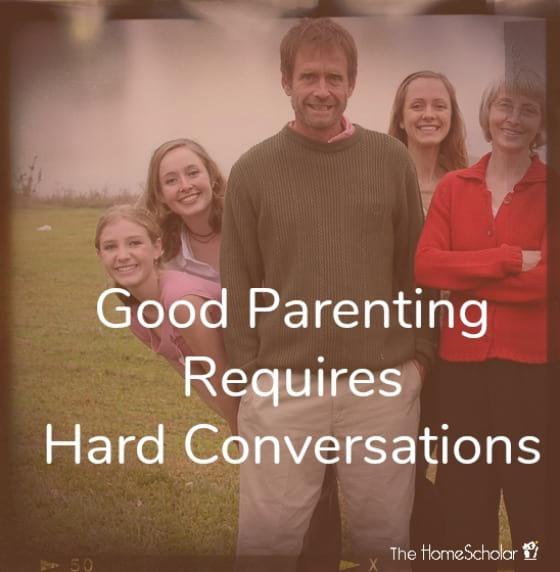
Good Parenting Requires Hard Conversations
Published on September 20, 2017 by LeeBinz

Before I began homeschooling, I worked as a counselor at a pro-life Crisis Pregnancy Center with young pregnant clients who were mostly Christian. It can happen even in a good family, with good friends, and a wholesome environment. Sometimes kids just make mistakes. It was not uncommon for a girl to come in and explain that her first time using alcohol, or her first boyfriend, or her first kiss led to a poor choice, and the next thing you know she is in big trouble. A crisis pregnancy can happen.
Good parenting requires a life-long, multiple conversations about healthy relationships. We can’t reasonably expect to change the culture, but we can explain the boundaries of healthy relationships so our children are prepared and don’t get hurt needlessly. We can’t control our children, but we can give them the best possible information to help them make good decisions.
Keep dialog open, and resolve to encourage discussion. Shutting down a conversation with threats or Bible verses alone is not going to be as helpful as talking through each issue calmly. Don’t say “I’ll kill you.” One teenager I met was terrified of telling her father she was pregnant, and truly believed her father, the church pastor, was completely serious when he said that. Don’t say “I never want to hear you say…” or they may not tell you, even if they should be clear about what is happening.
Before I had children, I worked full time as a nurse in a hospital surgical unit. I was shocked at the young people I saw who were completely ignorant of their body. Some suffered life-threatening cancers as they suffered after years of avoiding embarrassing lumps without telling parents or their doctor. It’s important to share information with factual, anatomically correct words. It shouldn’t be embarrassing, because these are simply words like “ear” or “nose.” Simple vocabulary and open dialog can save lives.
Working as a nurse, I cared for people from all walks of life without judgment. As your children grow and develop friendships outside the home, they will be exposed to other views. Even with your Christian children, explain relationships from a secular perspective, as well as faith-based. Their friends may need secular reasoning, or your children may go through a rebellious season and reject Biblical reasoning. Providing general information on healthy and unhealthy relationships can cover many seasons and unexpected happenings. Discuss personal safety issues, clues to abusive relationships, and cohabitation.
Our current culture is steeped in pornography. With the prevalence of the internet and smart phones, the average age of first exposure to pornography around 11 years old. It’s important for us to provide information about healthy relationships to counter the culture. Parents need to explain what might be seen, and what to do if they accidentally encounter porn. Relationship studies become more important as the culture struggles with rampant pornography. Whether directly or tangentially through friends, we must address the issues head on. There are many and they are not easy to face.
Every child is unique, and so is every family situation, friend environment, and social milieu. I can’t tell you what is the best book for you and your child to read about for particular issues. If your child watches popular TV shows and listens to Top 40 music, then more is better. If your child is more sheltered, then the shocking aspects of popular culture may not be necessary, but the topic is still important.
Relationships are relevant to all teenagers. Eventually they will grow up and begin to make their own decisions. If overly sheltered, in their ignorance they may be easily swayed. You want your child to to be prepared to make good decisions, and knowledgeable enough to be safe.
For more information, or simply a jumping off point, you may want to read my Relationship and Purity Studies Book List.


